
MEMORY & COGNITION
Scope & Guideline
Connecting Research to Real-World Cognition
Introduction
Aims and Scopes
- Memory Processes:
The journal publishes research that explores different types of memory, including episodic, semantic, and working memory, emphasizing their mechanisms, interactions, and implications for cognition. - Cognitive Load and Attention:
Studies examining how cognitive load affects memory retention and retrieval, and how attention allocation can influence memory outcomes, are central to the journal's scope. - Individual Differences:
Research focusing on individual differences in memory performance, including age, cognitive abilities, and cultural factors, is frequently featured, highlighting the variability in memory and cognition. - Neuroscience and Cognitive Models:
The journal includes studies that utilize neuroimaging techniques and computational models to investigate the neural correlates of memory and cognitive processes, contributing to a deeper understanding of these phenomena. - Practical Applications:
Research that has implications for educational practices, clinical settings, and everyday cognitive tasks is a significant focus, aiming to bridge theoretical understanding with real-world applications.
Trending and Emerging
- Integration of Technology in Memory Research:
There is an increasing trend of utilizing technology, such as virtual reality and neuroimaging, in memory studies, allowing for more immersive and detailed investigations into cognitive processes. - Metacognition and Self-Regulation:
Emerging research focuses on metacognitive processes, including how individuals monitor and control their memory strategies, reflecting a growing interest in self-regulated learning and memory. - Cultural and Contextual Influences:
Research exploring the impact of cultural factors and context on memory and cognition is gaining traction, highlighting the importance of understanding memory in diverse settings. - Social Memory and Collective Cognition:
An increasing emphasis on social aspects of memory, including collective memory and how social interactions influence individual memory processes, is evident in recent publications. - Memory in Applied Settings:
There is a noticeable uptick in studies examining memory applications in real-world contexts, such as educational settings, clinical environments, and everyday decision-making.
Declining or Waning
- Traditional Memory Paradigms:
There has been a noticeable decline in studies relying on traditional memory paradigms, such as basic recall and recognition tasks, as researchers increasingly explore more dynamic and complex scenarios. - Overemphasis on Age-Related Differences:
Research specifically focusing on age-related differences in memory has reduced, possibly due to a shift towards more nuanced investigations of cognitive processes across diverse populations and contexts. - Basic Memory Models:
The prevalence of studies solely focused on basic memory models without integrating cognitive processes or real-world applications has waned, indicating a move towards more integrative approaches.
Similar Journals
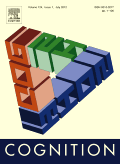
Cognition
Leading the Way in Cognitive Research ExcellenceCognition, published by Elsevier, is a leading journal dedicated to the exploration and advancement of knowledge in the multifaceted fields of cognitive neuroscience, cognitive psychology, and linguistics. Since its inception in 1972, this prestigious journal has established itself as a prominent platform for disseminating innovative research and critical reviews, achieving a remarkable Q1 ranking across various relevant categories, including Cognitive Neuroscience and Developmental Psychology, as per the 2023 metrics. With a focus on providing insights that are vital for researchers, professionals, and students alike, Cognition boasts an impressive standing in the academic community, evidenced by its high Scopus rankings which place it in the top percentiles in several disciplines. Researchers interested in the cognitive processes underlying human thought, language, and behavior will find Cognition an invaluable resource that publishes cutting-edge findings and fosters interdisciplinary collaboration. Though it operates under a traditional access model, the breadth and depth of its content ensure it remains integral to advancing cognitive science.
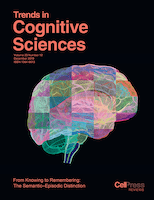
TRENDS IN COGNITIVE SCIENCES
Shaping the Future of Cognitive UnderstandingTRENDS IN COGNITIVE SCIENCES, published by CELL PRESS, stands as a premier platform for the dissemination of high-quality research in cognitive neuroscience, experimental psychology, and neuropsychology. With an impressive impact factor and consistently placed in the Q1 category across multiple dimensions of cognitive research, this journal not only ranks in the top tier of its fields—holding the 1st position in both Cognitive Neuroscience and Neuropsychology but also boasts an exceptional percentile ranking of 99. As it converges from 1997 to 2024, it reflects the evolving landscape of cognitive sciences, making it a vital resource for researchers, professionals, and students seeking to stay updated on influential trends and groundbreaking studies. Though not an open-access journal, TRENDS IN COGNITIVE SCIENCES offers readers access to a wealth of information that shapes our understanding of complex cognitive processes and behaviors.

PSYCHONOMIC BULLETIN & REVIEW
Transforming Ideas into Impactful Psychological Knowledge.PSYCHONOMIC BULLETIN & REVIEW is a premier journal published by SPRINGER, dedicated to advancing the fields of psychology, particularly within the domains of Arts and Humanities, Developmental and Educational Psychology, and Experimental and Cognitive Psychology. With its ISSN 1069-9384 and E-ISSN 1531-5320, the journal serves as a vital resource for researchers, professionals, and students striving to stay at the forefront of psychological science. The journal boasts an impressive impact factor and ranks in the top quartile (Q1) in relevant categories, reflecting its prestigious standing in the academic community. Covering research from 1994 to 2024, it offers rich interdisciplinary insights into psychological processes and theoretical developments, supporting researchers in disseminating their findings effectively. While not an open-access journal, it provides various access options to ensure that vital research remains within reach of its audience. With a commitment to fostering scholarly dialogue and innovation, PSYCHONOMIC BULLETIN & REVIEW plays an indispensable role in shaping contemporary psychological discourse.

JOURNAL OF MEMORY AND LANGUAGE
Advancing Insights in Cognitive Science and LinguisticsJOURNAL OF MEMORY AND LANGUAGE, published by Academic Press Inc Elsevier Science, is a prestigious journal dedicated to advancing the understanding of cognitive processes related to language and memory. With an impact factor that underscores its authority and relevance, the journal has achieved remarkable recognition, ranking in the Q1 quartile across multiple disciplines such as Artificial Intelligence, Experimental and Cognitive Psychology, Linguistics and Language, and Neuropsychology and Physiological Psychology, as of 2023. With its origins tracing back to 1985, the journal continually provides a platform for high-quality research and innovative studies that intersect diverse fields including cognitive science and linguistics. Although it does not offer open access, the Journal of Memory and Language serves as an essential resource for researchers and professionals seeking to explore the intricate interplay between memory and language. Make sure to access state-of-the-art research that not only informs theoretical frameworks but also has practical implications in real-world situations.
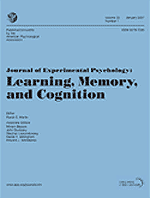
JOURNAL OF EXPERIMENTAL PSYCHOLOGY-LEARNING MEMORY AND COGNITION
Advancing the frontiers of cognitive science.JOURNAL OF EXPERIMENTAL PSYCHOLOGY-LEARNING MEMORY AND COGNITION is a premier publication of the American Psychological Association, focused on the intricate mechanisms of learning, memory, and cognition. Established in 1975, this esteemed journal has consistently delivered impactful research, evidenced by its Q1 ranking in both Experimental and Cognitive Psychology and Linguistics and Language categories for 2023. With an impressive impact factor and ranked in the top percentiles of multiple fields, it serves as a crucial resource for researchers, professionals, and students who aspire to deepen their understanding of cognitive processes. The journal’s rigorous peer-review process ensures that only the most innovative and high-quality studies are published, providing a platform for groundbreaking findings that advance the field. Though not open access, the insights within each issue are invaluable for anyone interested in the dynamics of human cognition and memory.

Cognitive Research-Principles and Implications
Exploring the Frontiers of Cognitive Science.Cognitive Research: Principles and Implications, published by SPRINGER, is a premier open-access journal dedicated to the dynamic field of cognitive neuroscience and experimental psychology. Since its inception in 2016, this journal has rapidly established itself as a leading platform for disseminating innovative research, achieving impressive rankings of Q1 in both Cognitive Neuroscience and Experimental and Cognitive Psychology in 2023. With a Scopus ranking of #16 out of 165 in Experimental and Cognitive Psychology and #28 out of 115 in Cognitive Neuroscience, it serves as a vital resource for researchers and practitioners eager to explore the intricacies of cognitive processes. Operating from its base in the United Kingdom, the journal offers open access to its articles, ensuring that groundbreaking research is widely available and can influence both academic inquiry and real-world applications. As the field continues to evolve, Cognitive Research: Principles and Implications remains an essential reference point for advancing understanding in cognitive science, making it an indispensable tool for students, professionals, and academics alike.

Cognitive Neurodynamics
Illuminating the Dynamics of Thought and Behavior.Cognitive Neurodynamics is a leading journal in the field of cognitive neuroscience, published by Springer in the Netherlands. With an ISSN of 1871-4080 and an E-ISSN of 1871-4099, this journal has established itself as a prominent platform for innovative research from its inception in 2007, continuing to enrich the academic landscape through 2024. Recognized for its significant contributions, Cognitive Neurodynamics holds a Q2 quartile ranking in cognitive neuroscience and impressively ranks #27 out of 115 in the Scopus database, placing it in the 76th percentile among its peers. While the journal is not open access, it offers a wealth of studies focusing on the intricate dynamics of cognitive processes and neurobiological mechanisms, making it essential reading for researchers, professionals, and students alike. Its objective is to bridge the gap between theoretical insights and practical applications, fostering a deeper understanding of cognition through multidisciplinary approaches. Explore the latest advancements in cognitive dynamics and contribute to the evolving dialogue within this fascinating field.

Journal of Cognitive Science
Illuminating the Pathways of Thought and LanguageThe Journal of Cognitive Science, with ISSN 1598-2327, is a distinguished publication from SEOUL NATL UNIV, INST COGNITIVE SCIENCE, focusing on the multidisciplinary field of cognitive science. Established in 2016, this journal aims to advance knowledge in various domains, including Artificial Intelligence, Cognitive Neuroscience, and Experimental Psychology, while also delving into Linguistics and Language. Although currently categorized in Q4 for several subjects in the 2023 rankings, it presents an invaluable platform for innovative research and scholarly discourse, providing insights that connect cognitive processes with practical applications, thus fostering cross-disciplinary collaboration. Located in South Korea, the journal adheres to rigorous academic standards, inviting submissions that contribute significantly to understanding cognition in a digital age. While it does not offer Open Access, readers can access articles through university libraries and academic databases, engaging with the latest findings and theories that shape the future of cognitive science.
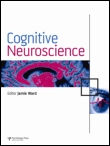
Cognitive Neuroscience
Transforming Research into Cognitive BreakthroughsCognitive Neuroscience is a pivotal journal in the ever-evolving field of cognitive neuroscience, published by Routledge Journals, Taylor & Francis Ltd, in the United Kingdom. Since its inception in 2010, this journal has dedicated itself to publishing innovative research that explores the intricate relationships between neural mechanisms and cognitive processes. With an increasing focus on interdisciplinary studies, it addresses critical issues from both theoretical and empirical perspectives. Although it currently holds a Q3 ranking in the Cognitive Neuroscience category, it has made significant strides in its Scopus ranking, now positioned at #62 out of 115, reflecting its growing impact on the academic community. Researchers and professionals will find the journal an invaluable resource for staying updated on the latest findings and methodologies in the field. While the journal operates under a traditional access model, it ensures high visibility and dissemination of crucial research that shapes our understanding of the brain's role in cognition. As it continues to evolve through to 2024, Cognitive Neuroscience remains committed to fostering collaboration and inspiring future innovations within the discipline.
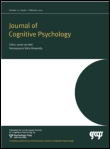
Journal of Cognitive Psychology
Pioneering the future of cognitive research.Journal of Cognitive Psychology is a premier peer-reviewed journal published by Routledge Journals, Taylor & Francis Ltd, located in the United Kingdom. With an ISSN of 2044-5911 and E-ISSN 2044-592X, this journal is dedicated to advancing the field of cognitive psychology by disseminating high-quality research findings and theoretical insights. Spanning from 2011 to 2024, the journal occupies a significant position in its field, classified in the Q3 quartile for 2023 in Experimental and Cognitive Psychology, and ranked #117 out of 165 in the Scopus database, indicating its relevance and contribution to the discipline. The impact factor reflects its evolving nature and the increasing interest in cognitive processes, making it a vital resource for researchers, professionals, and students alike. As the landscape of cognitive psychology continues to grow, the journal remains committed to exploring cutting-edge topics and methodologies, while engaging with dynamic challenges associated with cognition and behavior. Readers are encouraged to utilize the Open Access options available, ensuring seamless accessibility to this crucial body of work.